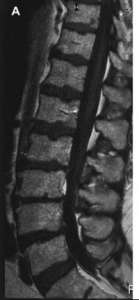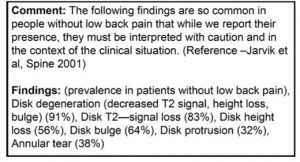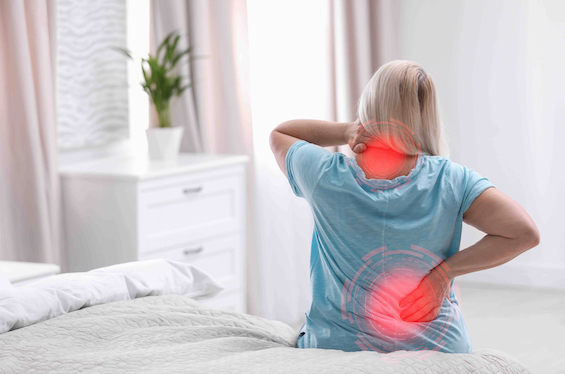I have back pain, do I need an MRI of my back?
This is a question that we hear often in the clinic. People are curious about what is going on in their back when they are suffering low back pain, which is not surprising. We associate pain with seeing the cause a cut, a bruise or a bump. People imagine that there is something there, in their back, that either shouldn’t be there or is out of position, which needs put “back in to place’’. Some sort of anatomical structure that is causing their pain. So, is it worth getting an x-ray or a scan? Well, the main point to note is there is a lot a scan doesn’t show. Primarily, it doesn’t show pain! So we have to use our skill to interpret the scan with this in mind.
Why get a scan for back pain?
Scans are really good at showing up a few conditions, such as cancerous tumours, fractures and infections. There are other less serious pathologies that show up such as nerve compression due to disc extrusion and high grade listhesis (bony slippage), but these things are not as common (making up only approximately 5% of all low back pain) and are associated with signs of nerve compression – pins and needles, numbness or weakness in the legs. Together with modic changes (bony oedema of the vertebral body), these findings are what are called ‘specific pathologies’. The rest of all back pain is called ‘non-specific’ and is called this because nothing that is seen on scans can be associated with pain.
What are the benefits of a scan?
Scans are very detailed, which can be a problem. They show lots of different changes that really are irrelevant. They have been described as wrinkles or grey hair in the spine. Their presence increases with age, but they are not painful. By the age of 50, a typical scan in a person that does not get back pain will include: degeneration of the spinal discs (severe desiccation) (91%), bulging disc (64%), loss of disc height (56%), disc protrusion (32%), disc extrusion (without nerve compression) (6%), and tears in the disc (38%) (Jarvik et al 2001). So if you do get a scan, you have to be prepared that you are probably going to be told you have some of these changes present in your back, but it will have nothing to do with your pain! Therefore, it is irrelevant. You need to think of it as grey hair!
Even though scans are really detailed, they don’t show up ‘subluxations’ or pelvic misalignments. Not because they are not detailed enough, but because, as the evidence confirms, these pathologies do not exist. They are only marketing pathologies that help certain practitioners keep their patient numbers up by ensuring their patients keep coming back to them for adjustments! People do suffer from long term back and pelvic problems. Fortunately, their poor outcome is not related to their pathology, but what they believe because of what they have been told! Beliefs have been show in the evidence as a major factor in a person’s outcome. This is fortunate, because beliefs can be changed with hard facts!
What happens at Physis?
At physis we constantly challenge our beliefs by critically appraising the evidence. You will not hear us say ‘Oh dear! You have the spine of an 80 year old!’ when looking at your scan (unless you are 80 years old!). You won’t hear this because we know that what your spine looks like on a scan does not relate to your pain, and does not predict your outcome. We know that throw away comments like this can be hugely damaging to your beliefs, instilling fear and lack of confidence in your body, which ultimately changes the way you use it, and not in a good way!
How does fear drive pain?
Fear is a massive driver of disability. Clients of have or experience the fear pain. We often fear damaging our spine. Fear of putting your pelvis out! In the medical world fear is measured and used to predict a person’s outcome, and the evidence consistently shows it is an accurate predictor. But like any fear, it can be overcome. Through careful and thorough examination, we can help you through the puzzle that is your pain, and get you back to doing the things you either have to, or want to, or both.
If you would to discuss your back pain or overcome back pain please contact us or make an appointment phone: 0131 478 4646.




